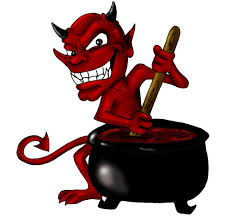devil
英 [ˈdev.əl]
美 [ˈdev.əl]
- n. 魔鬼;撒旦;家伙;恶棍;淘气鬼;冒失鬼
- vt. 虐待,折磨;(用扯碎机)扯碎;(替作家,律师等)做助手;抹辣味料烤制或煎煮
使用频率:

记忆方法
1. de- + evil => devil.
中文词源
devil 魔鬼
来自拉丁语diabolus, 穿过,诽谤,攻击,词源同diabolic.来自dia-,穿过,-ball, 投掷,词源同ballistic, kill. 后用于指魔鬼。
devil ’s advocate 故意唱反调的人来自天主教神学名词。原指教堂的一项特殊职务,其职能是对即将宣圣或成为圣徒的凡人进行行为或德行审查,以确保成为圣徒者德行之完美,其对应职务为God’s advocate. 其原先功能部分类似于现在的中纪委,而现在的词义就类似于走过场,一唱一和以使程序完美。
英语词源
- devil
-
devil: [OE] English acquired devil in the 8th century via late Latin diabolus from Greek diábolos, which originally meant ‘slanderer’. It was a derivative of diabállein ‘slander’, a compound verb literally meaning ‘throw across’, formed from diá ‘across’ and bállein ‘throw’ (whence English ballistics). The Greek word has reached most European languages: for example French diable, Italian diavolo, German teufel, Dutch duivel, Swedish djāvul, and Russian djavol. It has also given English diabolical [16], and indeed diabolo [20], a game played by spinning a top (named from a variant of Italian diavolo) on a string.
=> ballistics, diabolical - devil (n.)
- Old English deofol "evil spirit, a devil, the devil, false god, diabolical person," from Late Latin diabolus (also the source of Italian diavolo, French diable, Spanish diablo; German Teufel is Old High German tiufal, from Latin via Gothic diabaulus).
The Late Latin word is from Ecclesiastical Greek diabolos, in Jewish and Christian use, "Devil, Satan" (scriptural loan-translation of Hebrew satan), in general use "accuser, slanderer," from diaballein "to slander, attack," literally "throw across," from dia- "across, through" + ballein "to throw" (see ballistics). Jerome re-introduced Satan in Latin bibles, and English translators have used both in different measures.
In Vulgate, as in Greek, diabolus and dæmon (see demon) were distinct, but they have merged in English and other Germanic languages.
Playful use for "clever rogue" is from c. 1600. Meaning "sand spout, dust storm" is from 1835. In U.S. place names, the word often represents a native word such as Algonquian manito, more properly "spirit, god." Phrase a devil way (c. 1300) was originally "Hell-ward, to Hell," but by late 14c. as an expression of irritation.
Devil's books "playing cards" is from 1729, but the cited quote says they've been called that "time out of mind" (the four of clubs is the devil's bedposts); devil's coach-horse is from 1840, the large rove-beetle, which is defiant when disturbed. "Talk of the Devil, and he's presently at your elbow" [1660s].
权威例句
- 1. Tim wondered how the devil they had managed it.
- 蒂姆想知道他们究竟是怎么做到的。
- 2. She even claimed the couple's daughter was possessed by the devil.
- 她甚至宣称那对夫妇的女儿被魔鬼附了体。
- 3. "I think he was a bit of a devil," Constance said.
- “我想他有点儿淘气,”康斯坦丝说道。
- 4. Every one for himself and the devil take the hindmost.
- 人人都只考虑自己,谁落后谁倒霉。
- 5. Right now the poor old devil's drinking himself silly.
- 这会儿那可怜的老家伙又喝得糊里糊涂的了。
